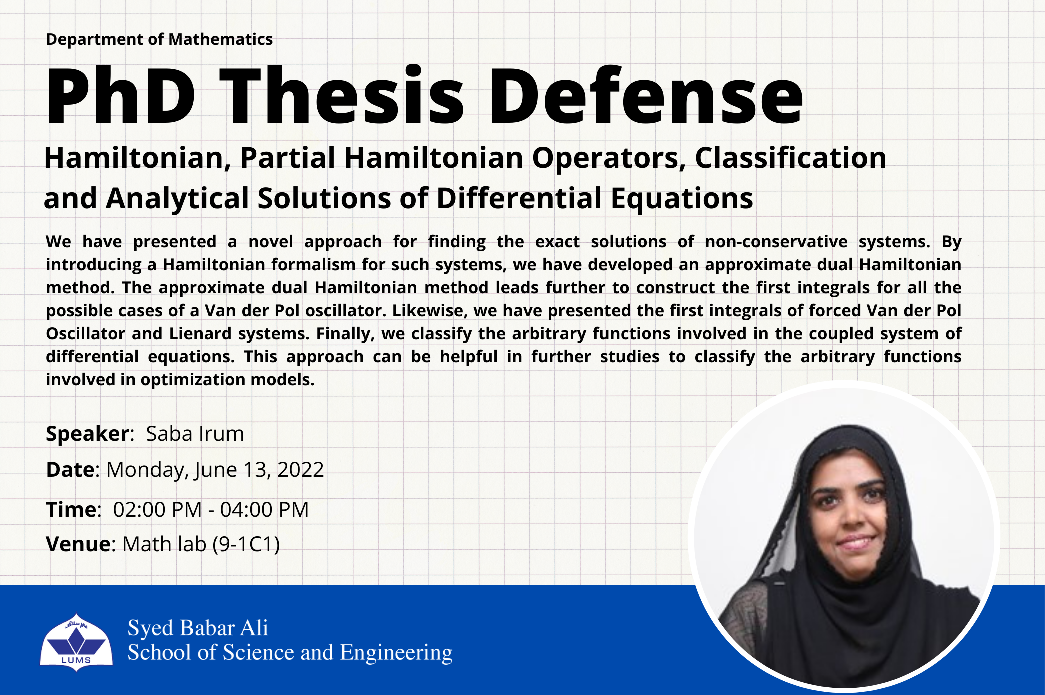
Hamiltonian, Partial Hamiltonian Operators, Classification and Analytical Solutions of Differential Equations
Abstract:
Differential equations play a significant role in the mathematical modeling of almost all the physical and natural processes. Differential equations are used to study the behavior of large and complex biological and economic models. In engineering, physics, and chemistry the differential equations are widely used to formulate the fundamental laws. Most of these laws are modeled as a coupled system of nonlinear differential equations. Numerical methods can be utilized to solve these nonlinear systems. The exact solutions enable the researchers to understand the dynamics of the system with solid mathematical backing. However, computing the exact solutions has been a challenge as it is not easy to construct such solutions for coupled nonlinear differential equations.
The Hamiltonian and partial Hamiltonian approaches are used to obtain exact solutions of the system of nonlinear differential equations via first integrals. These approaches to compute the first integrals and conservation laws are algorithmic and systematic. Moreover, these approaches can be used to derive the solutions for differential equations arising in different fields of social and fundamental sciences.
We obtained a systematic approach that provides the first integral of singular optimal control problems utilizing the partial Hamiltonian version of the Noether-type theorem. To investigate the effectiveness of the approach, some models from different fields of science and engineering are studied in this work. The method can be easily applied to many state and control variables. We use the partial Hamiltonian approach to solve singular optimal control problems with different complexity levels. A hybrid vehicle optimal energy management model, well-known harvesting model, and membrane filtration system are studied to obtain the first integrals. Then these first integrals are used to construct the closed-form solutions for the state and control variables. Finally, we have presented the solution graphically to compare the closed-form solutions and numerical results.
The partial Hamiltonian approach is further extended from the canonical Hamiltonian systems to the current value Hamiltonian systems, which arise in the economic growth theory. In current environmental and economic challenges identifying the optimal number of tourists allowed to visit a specific destination is a backbone for the countries depending on the tourism industry. We studied the economic growth model for tourism under the limitation of crowding conditions, environmental and economic resources. The current value Hamiltonian function is used to determine the necessary first order conditions for the optimal values of state and control variables. We have analyzed that the steady-state outcome, which shows that the economy converges to its balanced growth path in the long run. We have presented the environmental shocks, which play a critical role in policy making. We have also constructed the closed-form solutions of the two-sector renewable natural resource-based economic growth model using the partial Hamiltonian approach.
There was no existing theory for deriving the exact solutions for the non-conservative systems. In order to cover the gap in the literature, we have presented a novel approach for finding the exact solutions of non-conservative systems. By introducing a Hamiltonian formalism for such systems, we have developed an approximate dual Hamiltonian method. The approximate dual Hamiltonian method leads further to construct the first integrals for all the possible cases of a Van der Pol oscillator. Likewise, we have presented the first integrals of forced Van der Pol Oscillator and Lienard systems. Finally, we classify the arbitrary functions involved in the coupled system of differential equations. This approach can be helpful in further studies to classify the arbitrary functions involved in optimization models.
Thesis Defense Committee
1). Dr. Ali Ashher Zaidi (Convener of committee)
2). Dr. Shafay Shamail (External Member, CS-SSE)
3). Dr. Amer Rasheed (Member)
4). Dr. Imran Naeem (Supervisor)
5). Dr. Masood Khan (Examiner, QAU Islamabad)
Publications:
Irum, S, Naeem, I,” Closed-form solutions of an economic growth model of tourism”, Math. Meth. Appl. Sci. (2021). doi:10.1002/mma.7966
Irum, S, Naeem, I,” Finding the closed-form solutions of dissipative oscillatory systems”, Sci. Rep. (2022). doi:10.1038/s41598-022-08418-3
Irum, S, Naeem, I,” On the solutions of natural resource-based economy”, Comput. Appl. Math., (Submitted)

